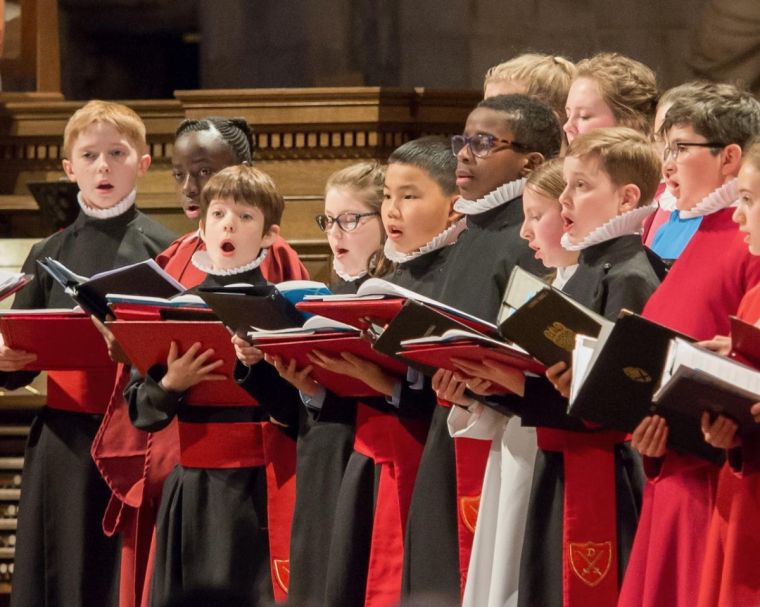As St Paul's Cathedral 'Diamond' Choir CD tops the classical charts, Anne Atkins sings a song of praise – and lament

I was brought up in an environment of immense privilege: of world-class musical and academic opportunities for children from the age of seven. Most of my playmates went on to win major music and academic scholarships to schools like King's Canterbury, Oundle, Uppingham and Eton. A sizeable handful eventually became internationally famous: composers, conductors, instrumentalists, academics, inventors, broadcasters and performers.
Alas: it was a privilege never open to me.
My father was Head Master of King's College Choir School in Cambridge. I looked up to the boys I grew up with almost as gods. Their voices surely came from Heaven... and television producers and national newspapers obviously thought so too.
It never occurred to anyone (let alone me) that I might have been given the same chance. For years I was so dedicated a tomboy that today I would have been transgender. It is only now that I realise why: girls couldn't even attend the school, let alone sing in the choir – required by Henry VI to train and educate 'sixteen boys'. No wonder I wanted to be one of them.
Thanks to my father's ideological convictions the school became co-ed, but this took all of his nineteen-year tenure and he had no jurisdiction over the choir.
When I had children of my own I didn't realise the world had changed – sadly, for our middle daughter: Salisbury Cathedral had just opened its doors to girl choristers, but even attuned as I was for such opportunities, the news hadn't reached me. Her life might have been so very different. Fiercely energetic, she would have thrived on the stimulation of such high standards and organisational demands... and might not have succumbed to the devastating anxiety disorder which instead has dominated her life.
Happily her sister Rose, younger by eighteen years, enjoyed three years' singing in Durham Cathedral, from nine to thirteen: an education which is already shaping her future. (Happily too her outstanding Head there, Yvette Day, is soon to inherit the job my father had and become the first woman Master Over the Choristers.)
As a result, she has recently been part of an initiative to make this extraordinary, uniquely British educational opportunity open to others, not just of both sexes but all backgrounds.
Last April, aged twelve, Rose travelled from Durham to St Paul's Cathedral for two days to sing with a choir of other choristers from around the UK: one from almost every Cathedral and College choir in the country. A rainbow of cassocked children in their dozens filled Wren's resounding vast bell with the immaculately-timed explosion of Zadok the Priest, after its relentlessly building suspense, to lift the hairs on the backs of the necks of everyone present.
What is striking, watching clips of interviews with these children made into a promotional video afterwards, is the buzz: here are eleven and twelve year olds as excited about getting Handel right as their peers are about Pokémon Go.
But at the fee-paying choir schools it is still a privilege open only to some. Indeed financially, it is less accessible than it was. My father was one of five clergy children; in the 1920s his chorister fees at King's Cambridge were only £8 a term, what the College deemed it would cost his parents to feed him at home. Now, even though the choristers' (sometimes boarding) fees are still heavily subsidised by the cathedrals and colleges they sing for (generally by between a quarter and a half) they are usually in their thousands: way beyond the reach of many, as they were to us living on a clergy stipend when our children were young.
The cathedrals too are struggling. Professional choirs can be extremely expensive to run, and for those cathedrals without legacy or foundation funding it can be a struggle. Our son was employed as a counter-tenor in one catheral, but came home early after he and others in the choir were told there was no longer the money to pay them.
Hence the get-together in St Paul's Cathedral last April. The event was to launch the Diamond Fund for Choristers (set up by the Friends of Cathedral Music) established with the aim of raising £10 million by 2020.
Not just to help cathedrals which might otherwise simply not have enough funds to support a choir, but to enable choristers of all backgrounds (as well as both sexes) to have the privilege denied to people such as me.
The resulting CD, released last week, is already top of the classical charts. I wish it could have been me singing on there. I wish it could have been all my children, not just my youngest. Indeed, I wish it could be every child with an ear and an inclination.
As perhaps now, one day it may be...
Anne Atkins is the author of three novels and has contributed to most of the UK's national newspapers. She is on Twitter @anne_atkins. The protagonist of Anne's second novel, On Our Own (a murder mystery) is an Aspergic and talented boy chorister at a world famous choir. Its sequel, An Elegant Solution, will be out next.











